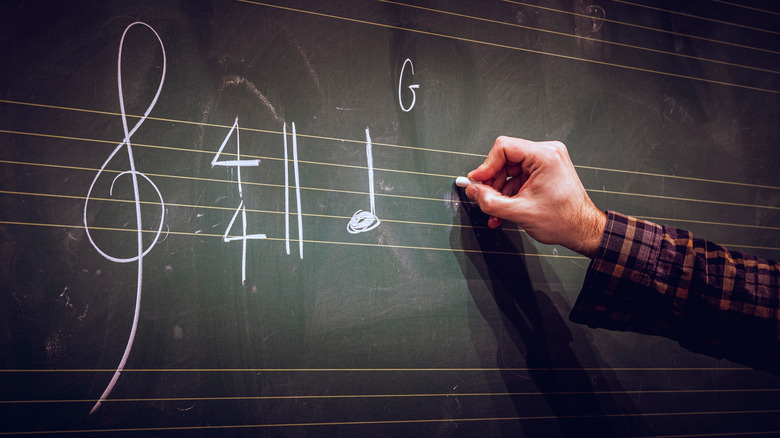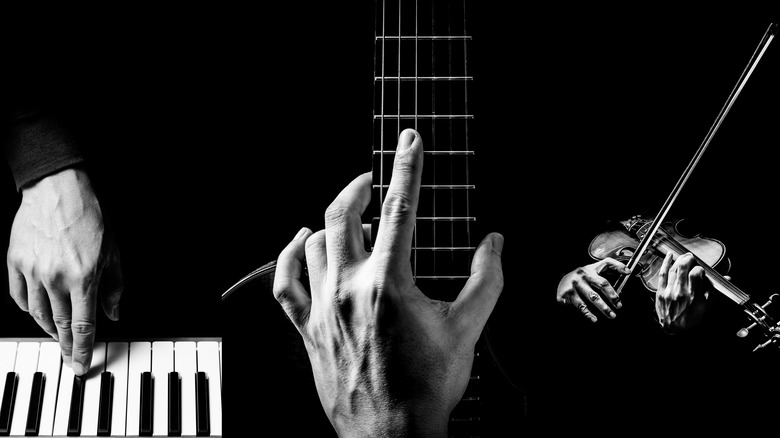Where Did Music Come From?
Venerated Russian author Leo Tolstoy wrote some of the greatest novels of all time, including "Anna Karenina" and "War and Peace," yet he was more of a believer in the power of music to move, rather than words. He stated (per AZ Quotes), "Music is the shorthand of emotion. Emotions, which let themselves be described in words with such difficulty, are directly conveyed to man in music, and in that is its power and significance." Hans Christian Andersen, author of timeless fairy tales like "The Story of the Ugly Duckling," similarly wrote (per Classic FM), "Where words fail, music speaks."
Most, if not all, of us have experienced not only the profound power of music to move, but to recall memory. A single musical phrase can take us back to a precise event and time, much like the smells of perfume or a signature, home-cooked childhood meal. And when music — mathematical patterns of structured rhythm and pitch — combines with words, words are vastly easier to remember, especially if the words rhyme. Twinkle, twinkle little star. (You know the rest.)
All in all, it definitely seems like musical understanding and aptitude is hard-wired into our neurology, much like language itself. But elephants also love music (on YouTube), as do chimps (check out the dance moves from about 3:05 on YouTube), cockatoos (dancing on YouTube), cows (loving a concertina on YouTube), and more. So where did music actually come from? How did musical abilities develop within our species, and what was their purpose?
Humanity's true universal language
It's important to think of "music" not only in its current, most involved incarnation, full of surgically manufactured top-40 soundscapes, boundary-pushing genre busters in whacky time signatures, or a Western musical history of everything from medieval liturgies to Gershwin's "Rhapsody in Blue." We've got to strip it down, step away from musical theory, and look at music in its most fundamental form: tempo, pitch, melody, and so forth. A dude hitting a rock with a stick and humming by a fire.
The question of where music comes from might look like a no-brainer. It's critical to social bonds. It helps us remember things. All cultures worldwide sing lullabies to babies, as New Scientist points out. In fact, folks from any culture can understand the difference between other nations' lullabies and "healing" and "dancing" music, as the Harvard Gazette reports. Such healing or dancing music is often connected to rituals and ceremonies, like those of numerous Native American tribes — Pawnee, Dakota, Seminole, and numerous others — still carried on today (watchable on YouTube). There is also some form of measurable, universal "musical grammar" that makes all humans inherently understand how a bass tone resolves a melody, for instance. It's very much the case that music is our ultimate universal language.
In the end, music's origin is a chicken-and-egg problem. Either, as Discover Magazine outlines: 1) it's a useless byproduct of cognition (an egg), or 2) it's an essential cognitive experience (a chicken).
A chicken-and-egg dilemma of human social bonds
In his 1997 book "How the Mind Works," per Discovery Magazine, evolutionary psychologist Steven Pinker (presumably not a big music guy) called music "auditory cheesecake." That is, it's a sweet, unnecessary embellishment of neurology that changes nothing about humanity's history or lifestyle. Or as Pinker very gravely said, "As far as biological cause and effect are concerned, music is useless."
The opposite side states that the capacity for music was an integral part of group cohesion in humanity's early days, now manifested in all those lovely ceremonial dances, songs, and lullabies previously mentioned. That's not to say that human evolution developed to create music. Rather, the same neurological structures and capabilities that allow us to analyze patterns in speech, or respond to the voice of a caregiver or an injured member of the tribe, for example, allowed for a deep connection to sound — especially voice — as it produced emotional experiences historically essential to our survival. Those sensations drove human action and can be tapped by the "emotional shorthand" of music, as Tolstoy put it: reverence, wonder, wrath, despair, bitterness, joy, you name it.
In corroboration, one 2009 study cited on Wired showed that tamarin monkeys respond to music that mimics their own vocal frequencies and patterns. Composer David Teie wrote "Fearful monkey music" and "Happy monkey music," which increased and reduced their anxiety, respectively. Also of note: The monkeys found Metallica's "Of Wolf and Man" quite soothing.
A new study that connects genetics and culture
The most comprehensive theory for the origins of music might have come from a thorough, cross-disciplinary 2020 study titled "Music as a Coevolved System for Social Bonding," available on Cambridge University Press. The paper postulates not a chicken-and-egg origin of music, but a concurrent "gene-culture coevolution," whereby "proto-musical behaviors that initially arose and spread as cultural inventions had feedback effects on biological evolution due to their impact on social bonding."
So a typical "lullaby" from a caregiver to an offspring, for example? It elicited responses that made it more likely for the caregiver to continue singing, which strengthened their bond and made them more likely to survive and pass on their genes. That baby grew up more musically adept than her forbears, physiologically and culturally, and sang to her children in a slightly more complex way. Caregivers continued caring, and tens of thousands of years later we've all got a soft spot for ballads. It's hard to tell how long ago this started, especially because the first instrument was undoubtedly our built-in voice, but crafted musical instruments have been found dating back to 40,000 years ago, per the BBC. Our cousin humans, Homo neanderthalensis, might have created music, too.
Even if we get to the bottom of music's origins, though, does it change much? After all, part of the joy of music is not only its ability to communicate the ineffable, but the mystique and beauty of how it all works.



